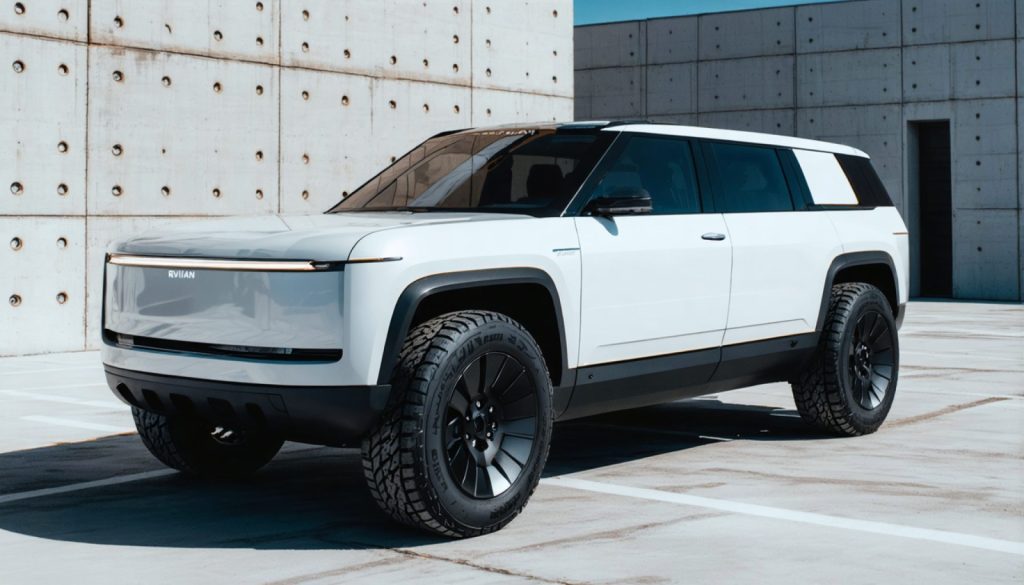
- RJ Scaringe spearheads a new Rivian spin-off, “Also,” to revolutionize micromobility with cutting-edge, affordable electric solutions.
- Backed by $105 million in funding and a talented team from leading tech companies, Also aims to launch its flagship product next year, focusing on bike-like innovations targeting urban markets worldwide.
- Also targets global markets, including U.S., Europe, Asia, and South America, emphasizing accessible e-mobility without premium price tags.
- Chris Yu, former Specialized executive, leads Also with experience and vision, especially for commercial opportunities in European cities.
- The venture leverages Rivian’s technological expertise to overcome e-bike market challenges and build a scalable platform for urban delivery.
- Also aims to disrupt the e-bike market’s supply chain and cost structure, democratizing access to high-quality, sustainable transportation.
- Also’s vision goes beyond e-bikes to include innovative solutions for diverse urban mobility needs, driven by Rivian’s “never say never” approach.
On the winding roads of innovation, RJ Scaringe, the visionary behind Rivian, dared to imagine a future where electric mobility extended beyond the bounds of conventional vehicles. More than a decade after establishing Rivian, the seeds of this contemplation have blossomed into a groundbreaking venture. Welcome “Also,” the new spin-off aimed at transforming the landscape of micromobility.
Emerging from a stealthy project within Rivian, Also received life with a mission: to distill Rivian’s cutting-edge technology into smaller, more affordable electric solutions. From this fertile ground sprouted a separate entity, infused with $105 million in fresh funding and a vibrant team that draws talent from stalwarts like Apple, Google, Specialized, and Tesla. Its heartbeat echoes the ambition to blend Rivian’s robust tech with sleek, accessible e-mobility designs.
Energy crackles within Also, as it prepares to unveil its flagship product next year. This nascent company holds aspirations that stretch across continents, from bustling U.S. cities to the dynamic urban centers of Europe, with eyes set on Asia and South America in subsequent phases. Both consumers and commercial enterprises await a new epoch of electric vehicles tailored for their diverse urban needs.
The venture remains somewhat enigmatic about its initial offering but suggests a bike-like innovation. With an emphasis on seamless design, this new entry aims to shatter price barriers historically associated with quality e-bikes.
Scaringe has long advocated for rationalizing the overpriced e-bike market. He views this venture as a way to rectify a convoluted supply chain and cost structure, ripe for disruption. His insights reveal a commitment to Rivian-quality micromobility at prices that won’t deter everyday adopters.
It’s a journey not taken alone. Chris Yu, ex-chief at Specialized, stands at the helm as president, steering Also with a wealth of experience. Together with their accomplished team, they foresee opportunities burgeoning not just for individual riders but within the commercial sector, particularly in European cities where traditional vehicles struggle against restrictions.
The technological edge comes from Rivian’s wealth of experience. With in-house power electronics, software, and computing prowess, Rivian’s collaborative DNA ensures that Also can soar above competitors constrained by limited technological resources.
A scalable platform is the mission, addressing urban delivery challenges head-on. Paralleled excitement and partnerships bubble beneath the surface, hinting at imminent revelations that could redefine the e-mobility paradigm for businesses.
Though their vision touches rickshaws and skateboards, the team remains grounded, pragmatic yet unshackled by conventional constraints. This audacious spirit, captured by Scaringe’s “never say never” attitude, marks a refreshing twist in the evolving story of urban transportation.
So, as Also readies for its polished debut, it embodies more than mere mobility. It represents Rivian’s evolving narrative of innovation, sustainability, and a reachable future, where the electric revolution is within everyone’s grasp.
Revolutionizing Urban Mobility: How Rivian’s Spin-off “Also” is Set to Transform Micromobility with Affordable E-Bikes
The Vision Behind “Also”
Emerging from the fertile innovation environment of Rivian, “Also” is poised to redefine the micromobility landscape by making electric mobility more affordable and accessible. Backed by $105 million in funding, “Also” aims to distill Rivian’s sophisticated technology into smaller, sustainable, and affordable electric solutions, suggesting a major disruption in the current market dynamics of e-bikes.
How “Also” is Reshaping the E-Bike Market
While Rivian remains synonymous with robust electric vehicle technology, “Also” leverages this expertise to launch a potentially game-changing e-bike. Many forecasts expect “Also” to address not only individual consumers but also commercial sectors in urban settings, particularly in Europe, where vehicle restrictions are increasing.
Key Features and Specs to Anticipate:
1. Advanced Power Electronics: Drawing from Rivian’s in-house capabilities, expect high-efficiency power management and software integration for superior performance.
2. Sleek and Seamless Design: The focus on aesthetic appeal combined with functionality could reshape how e-bikes are viewed in urban environments.
3. Affordability: By targeting a rationalized pricing strategy, “Also” hopes to overcome the cost barriers traditionally associated with high-quality e-bikes.
Real-World Applications and Use Cases
1. Urban Commuting: With rising urban congestion, Also’s e-bikes could offer a swift, cost-effective way to navigate city streets.
2. Commercial Deliveries: The scalable platform may serve delivery services, especially in regions where accessing city centers with traditional vehicles is increasingly restricted.
3. Sustainability Goals: By promoting electric solutions, “Also” contributes to global sustainability efforts, reducing reliance on fossil fuels and lowering emissions.
The Industry Landscape: Trends and Market Forecasts
The e-bike industry is witnessing significant growth. According to a report by Allied Market Research, the global e-bike market is projected to reach $118.65 billion by 2030, growing at a CAGR of 10.5% from 2021. This trend is driven by growing environmental awareness and a shift towards sustainable transport solutions.
Challenges and Considerations
1. Competition: “Also” will enter a competitive market with established players like Rad Power Bikes and VanMoof.
2. Technological Integration: Balancing cutting-edge tech with ease of use will be key to capturing market share.
3. Global Expansion: Navigating diverse regulatory environments and consumer preferences will be crucial as “Also” expands globally.
Tips for Prospective Buyers
– Assess Your Needs: Consider your daily commuting distances and terrain when evaluating e-bike options.
– Stay Informed: Keep an eye on product releases from “Also” to understand the latest offerings and integrations.
– Test Ride: If possible, test ride an “Also” e-bike to get a sense of its handling, performance, and comfort.
Conclusion
“Also” stands on the frontier of a micromobility revolution, driven by innovation, sustainability, and accessibility. By providing high-quality electric solutions at lower costs, “Also” is not just challenging industry norms but also setting new standards for urban transportation solutions. Stay ahead of the curve by monitoring this evolving market.
For more information on groundbreaking technologies and sustainability initiatives, visit Rivian.



